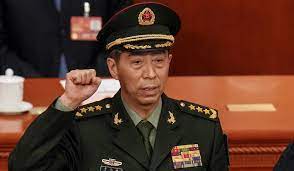
In a strategic move underscoring a shift in China’s defense leadership, the nation has appointed Dong Jun as its latest defense minister, replacing Li Shangfu, who was removed from his position two months ago under perplexing circumstances.
The appointment of Dong Jun to the prestigious role comes amidst Chinese President Xi Jinping’s vigorous military modernization efforts, aiming to fortify China’s standing as a formidable global power. This move aligns with President Xi’s agenda, raising concerns among neighboring countries about China’s expanding military influence.
Dong Jun, 62, previously held the esteemed position of the People’s Liberation Army (PLA) navy chief, highlighting his extensive experience within China’s military hierarchy. His tenure boasts significant involvement across crucial PLA divisions, including service in the Northern Sea Fleet, Eastern Sea Fleet, and the Southern Command Theatre, as detailed by local media reports.
While the defense minister is traditionally viewed as the public face of the PLA for media engagements and interactions with other militaries, reports suggest that the ministry holds limited sway over defense policy or military management within China.
The removal of Li Shangfu, who assumed the role of defense minister in March, remains shrouded in mystery. Li’s sudden disappearance from public view since August 25 prompted his dismissal in October, an event that lacked any formal explanation. Reports indicate that Li faced US sanctions due to his involvement in overseeing weapon acquisitions from Russia, resulting in his exclusion from entering the United States.
Following Li’s removal, China severed communication with the US military, primarily in protest against Washington’s arm sales to Taiwan, further exacerbating tensions between the two nations. Notably, Li’s tenure saw a strained relationship with the US counterpart, failing to hold meetings due to the sanctions.
The role of China’s defense minister assumes significance in mitigating conflict risks, particularly concerning Taiwan and the South China Sea. Li’s sudden departure underscores the complexities and sensitivities surrounding China’s defense policy and international relations.
Li Shangfu’s dismissal represents the second abrupt removal of a high-ranking official since President Xi Jinping’s third term commenced. This pattern of unexplained changes in leadership, notably Qin Gang’s replacement as foreign minister by Wang Yi earlier this year, adds layers of intrigue to the inner workings of China’s top-tier governmental and military positions.
The reshuffling within China’s defense and foreign affairs leadership underscores the evolving dynamics of the nation’s strategic initiatives and their implications for regional and global geopolitics.
Sources By Agencies


